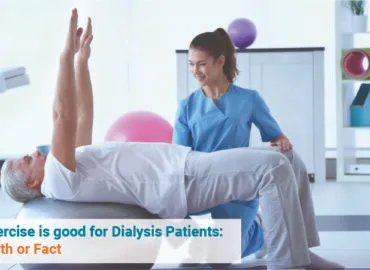Exercise is good for Dialysis Patients: Myth or Fact?
Dialysis patients tend to believe that they cannot exercise, primarily promoted by misguided beliefs that it will stress the kidney. In reality, exercise can be good for patients undergoing dialysis. Many who are suffering from any kind of kidney disease tend to get demotivated and depressed and forgo all kinds of activities.
While kidney disease should be taken seriously, it is possible to lead a close-to-normal-life with some changes to the lifestyle. Exercise forms a critical part of the lifestyle change.
Indoor exercises are recommended for dialysis patients. Any kind of motion, even if it is for a short time everyday, helps the patient feel much better, stronger, and more in control of their health. Some medical professional state that a limited regular exercise strengthens a person’s potential for physical activity and improves the overall quality of life of a dialysis patient.
Regular exercise helps the dialysis patient to perform activities that were enjoyed before the diagnosis and it is beneficial not only physically, but also for mental health. It could be as simple as returning to work, doing household chores, and maintaining a healthy lifestyle.

